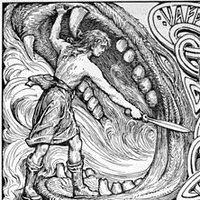
Vidarr
CBUB Wins: 0
CBUB Losses: 0
CBUB Ties: 0
Win Percentage: 0%
Added by: Dinsdale Piranha
Read more about Vidarr at: Wikipedia
Official Site: Public Domain
In Norse mythology, Víðarr (Old Norse, possibly "wide ruler", sometimes anglicized as Vidar, Vithar, Vidarr, and Vitharr) is a god among the Æsir associated with vengeance. Víðarr is described as the son of Odin and the jötunn Gríðr, and is foretold to avenge his father's death by killing the wolf Fenrir at Ragnarök, a conflict which he is described as surviving. Víðarr is attested in the Poetic Edda, compiled in the 13th century from earlier traditional sources, the Prose Edda, written in the 13th century by Snorri Sturluson, and is interpreted as depicted with Fenrir on the Gosforth Cross. A number of theories surround the figure, including theories around potential ritual silence and a Proto-Indo-European basis.
In the Poetic Edda, Víðarr is mentioned in the poems Völuspá, Vafthrúdnismál, Grímnismál, and Lokasenna.
In stanzas 54 and 55 of the poem Völuspá, a völva tells Odin that his son Víðarr will avenge Odin's death at Ragnarök by stabbing Fenrir in the heart. In stanzas 51 and 53 of Vafthrúdnismál, Vafþrúðnir states that Víðarr and his brother Váli will both live in the "temples of the gods" after Surtr's fire has ceded and that Víðarr will avenge the death of his father Odin by sundering the cold jaws of Fenrir in battle.
In stanza 17 of Grímnismál, during Odin's visions of various dwelling places of the gods, he describes Víðarr's (here anglicized as "Vidar") residence:
CBUB Match Record:
No Regular Play Records Available
No Fantasy Draft Records Available
